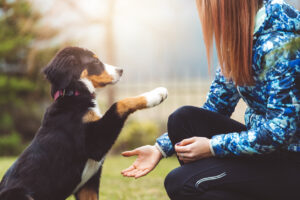Training pets is hard. There are many misconceptions about the best way to train and socialize puppies. Myths regarding puppy socialization, rewarding good behavior, and punishing bad behavior are quite common. Let’s take a look at each of these topics to determine what is accurate and most effective.
Socialization
Socializing puppies is important for many reasons. Socialization helps puppies to become comfortable with people, environments, buildings, sights, sounds, noises, smells, animals and other dogs. Puppies naturally become comfortable with things they encounter until they reach a certain age. When that age is reached, they will naturally be more suspicious and fearful of things they have not experienced. Therefore, timing is key. The sensitive developmental period is between three and 12 weeks of age.
There exists a common myth puppies should not socialize and meet other dogs until they are completely vaccinated. Generally vaccinations are given to puppies until 16 to 18 weeks of age. This is beyond the timeframe puppies are most sensitive to socialization. Research shows no greater risk of contracting infectious diseases exist if a puppy is socialized before their full series of vaccinations. If you wait for a puppy to receive all of his puppy shots, the critical time period he is most susceptible to socialization is missed. If you simply take some common sense precautions to protect your puppy, the risk of infection is quite low. However, the benefits your puppy will experience if he is healthfully socialized are quite significant in comparison.

Since puppies are most accepting of new experiences between three and 12 weeks old, this is a critical period for socialization. Between 12 and 18 weeks, the opportunity for a puppy to easily socialize lessens with each passing week. After 18 weeks, it is difficult to teach a dog something new or help her feel comfortable in frightening situations. Puppies who are properly socialized are less likely to be aggressive or fearful. They are more relaxed, peaceful and happy. Dogs who are not well socialized are constantly stressed by their environment.
When and how to use treats in training
There are myths regarding alternative behavior and whether using treats reinforces negative behavior. Pet owners should teach skills which allow dogs to succeed both at home and in public. Preventing undesirable behavior through effective management and rewards is appropriate. Rewarding desirable behavior makes sense while rewarding alternative behavior or counter conditioning may seem counterintuitive. However, counter conditioning can be an effective tool. Consider a dog who barks at strangers or other dogs while out for a walk. Used appropriately, offering a dog who barks at a stranger a treat teaches her something wonderful happens when they see another person or dog. The treat helps to transform the emotional response of fear to happiness.
Treats don’t always need to be used. They help teach the intended skill, encourage cooperation, and eventually build good habits. Over time, using treats as a constant reminder become less and less necessary. Positive affirmations such as “Good job!” can replace treats.

Is punishing behavior effective?
Punishment for negative behavior is controversial. If used, punishment must be used correctly in order to be effective. It must happen immediately, be intense enough to stop the behavior, and occur in the exact same manner every single time the negative behavior occurs. Clearly these guidelines are nearly impossible. Consider the example of a dog punished for jumping on the counter. How can a pet owner be assured of what their dog is learning through punishment? Perhaps the dog learns not to jump on the counter when their human is home. When their owner leaves the house, it is entirely possible the dog continues to jump on the counter. There is evidence punishment leads to increases in anxiety and aggression. Therefore, the consequences of using punishment in training may be far greater than any benefits attained.
The ideal way to socialize puppies and optimally train them is through appropriate management and rewards. Teaching puppies skills for success in the home as well as in public creates harmony, ensures their safety, enhances the human-pet bond, and establishes a firm foundation for success for the entire family. Good job!

